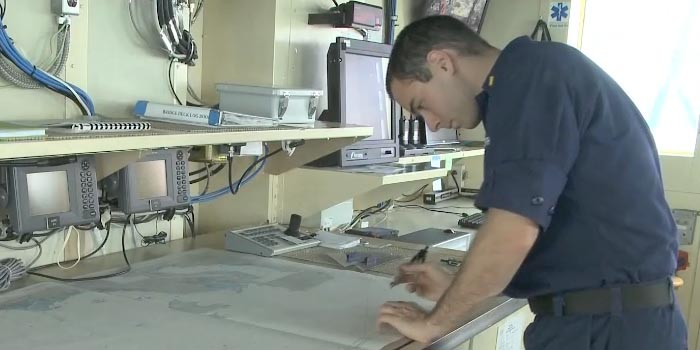Dr. Brian Kennedy: Video Transcript
Hear Brian Kennedy talk about his job and what it's like to conduct science while at sea. Download (mp4, 179 MB).
Introduction
My name is Ensign Brian Kennedy. I work on board the NOAA Ship Okeanos Explorer, America's ship for ocean exploration. She's a 224 foot, T-AGOS class vessel that specializes in exploring the deep reaches of the ocean that have never been seen before by mankind using high-precision mapping and ROV operations.
NOAA Corps
I am a NOAA Corps officer. NOAA Corps is the seventh and smallest uniformed service of the United States of America. In NOAA Corps you start off as an ensign with a base salary of about $30-35,000 per year which includes housing. The pay scale quickly increases as you go through the ranks. I've already been selected for promotion to Lieutenant Junior Grade and I am just waiting for that to come down. That continues with the same rank system as the Navy.
The Job
The research this ship is primarily involved with is more exploration. We go places where there is little or no data and basically see what's there. Once we see points of interest, we come back later with our remotely operated vehicle, which is a small submersible that we can go down to almost 4,000 meters. We can investigate the area with high-definition video and some chemical sensors, anything that the multibeam mapping shows might be of interest.
My job requires a lot of travel. I am stationed on the ship, so wherever the ship goes is my home for right now. The numbers of hours I work during the week varies with what the ship is doing. Forty hours is considered a base week, but there are some weeks I work a little bit less and some weeks I work a lot more. Underway, we work seven days a week, very often 10-11 hours a day, so you can really rack up the hours.

Brian Kennedy plots his career course.
Background
I wanted to be a marine biologist most of my life but there is one instance that really sparked my interest. I was 5 or 6 and my family went on a vacation to the Florida Keys and one day we were just walking through a marina and came across a manatee. According to my parents, I was absolutely captivated. Ever since then marine biology was all I wanted to do, or something with marine science.
Influence
My parents obviously had a major effect on what I wanted to do. Different teachers, I had a high school teacher, Vicki Souter, my ocean sciences coach and teacher had a major affect. I had two professors in college who stood out, Dr. Leslie Sautter and Dr. Gorka Sancho. Dr. Sautter was a marine geologist and Dr. Sancho was a marine biologist. They both had a dramatic effect on my life's course and ending up here at NOAA.
Job Perks
The most fascinating thing I have ever seen on this job? There isn't one item that stands out for me! Every day has its simply amazing thing, sunrise, sunsets, and dolphins. I've seen all sorts of different marine mammals, marine life; saw manta rays a couple of days ago, saw sea turtles today, just standing on the bridge wing. With the ROV down, every day is something new and fascinating from cucumbers, whole therians that live in mid-water column, when the ROV lights hit them they dance. The other day we saw a type of worm, called a polychaete worm that I had never seen before. It was mid-water column and looked more like a squid than the worm it was. It was one of the prettier things I've ever seen in my life. I have never seen a picture of before and many of the scientists were baffled by it also.
I have always valued scientific knowledge and thought that its pursuit was worthy. In my job now, I help facilitate scientific research which has a great value to me and a high reward knowing that I helped the efficiency and the operation of collecting new and novel data that scientists around the world will use to have better understanding of the deep ocean.
Obstacles and Possibilities
I have a B.S. in Maine Biology and a minor in Geology, so there is a wide breadth of what I could do. I could work for any kind of state natural resources agency; I can work in other parts of NOAA as a scientist. As a marine biologist or geologist, though, advanced degrees are pretty much required to do anything involved. If I wanted to pursue the hard sciences, which I am always considering doing, I would have to go back and get a graduate degree. For now, any kind of junior member of a science team doing coral reef research, fisheries biology, anything along those lines would be open to me.
Looking back, I really would not have changed a whole lot about my educational or career track. I am really quite happy where I am. This is a great first job out of college. I am seeing the world. I am close to the science. I possibly would consider going back to grad school to get more involved in the science side instead of the operations side. But, right now, I really love what I am doing. I am exposed to all different kinds of science. Every cruise we get a different chief scientist so it is really allowing me to explore the different avenues I could follow if I decide to leave NOAA Corp and some point to pursue an advanced degree in the sciences.
The biggest obstacles I encountered throughout my life were getting the experience I needed to advance myself. A lot of people go into marine biology so there is a pretty high weed-out rate. Persistency was what I found helped me.
Return to profile